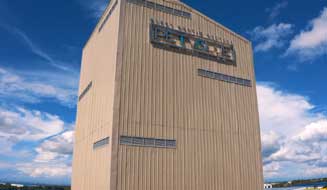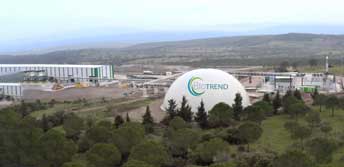Recycling: Indorama/Coke open largest PET recycling plant in Philippines; Biotrend Energy selects Honeywell technology for recycling plant in Turkey

Thailand-based integrated chemical firm Indorama Ventures Public Company Limited (IVL) has opened its PETValue bottle-to-bottle recycling plant in the Philippines, in partnership with Coca-Cola Beverages Philippines—the bottling arm of Coca-Cola in the country. The plant is IVL’s latest recycled PET facility as the global integrated petrochemicals company builds on its position as the world’s largest producer of recycled resin used in plastic beverage bottles.
PETValue Philippines, located in General Trias in Cavite Province south of Manila, is the country’s first food-grade, bottle-to-bottle recycling facility, and the largest in the Philippines. It was built by IVL in partnership with Coca-Cola Beverages Philippines, Inc. in accord with The Coca-Cola Company’s ‘World Without Waste’ program to collect and recycle the equivalent of every bottle it sells by 2030. As a result of the joint venture with Coca-Cola, IVL will recycle about 2 billion/year additional used PET (polyethylene terephthalate) plastic bottles in the Philippines and create about 200 new local jobs. The plant will wash and shred post-consumer bottles into flakes to produce recycled PET resin that is suitable for use in food-contact applications.
IVL has already surpassed the half-way milestone towards meeting its 2025 target of increasing its recycling capacity to 750,000 tonnes/year. The company is investing US$1.5 billion globally to expand recycling facilities and sustainable production, including a new ambition to reach post-consumer PET bale input of 1.5 million tonnes/year by 2030.
PETValue will introduce the most advanced technology and infrastructure in the Philippines, helping to improve collection and recycling rates and prevent leakage into waterways. The new plant will encourage a more robust waste value chain to help address the growing post-consumer waste management problem in the Philippines. PET plastic used in soft drinks and water bottles is 100% recyclable and the most collected plastic packaging in the world. Global brands including Coca-Cola are using more recycled plastic in their bottles to close the loop and deliver a circular economy.
Sanjay Ahuja, Executive President of Combined PET, Indorama Ventures, said, “PETValue is an important development for IVL, for our partner Coca-Cola, and for the Philippines community. IVL, as the largest producer of recycled PET resin, is bringing our global experience and know-how to grow capacity and recycle more bottles. This, together with our partner Coca-Cola’s powerful consumer footprint, represents significant potential for us, as purposeful companies, to close the loop on plastic bottle recycling and help resolve waste in the Philippines.”

Meanwhile in other news, US technology firm Honeywell says that Turkey’s Biotrend Energy will apply Honeywell’s UpCycle Process Technology in Biotrend Energy’s planned plastics recycling factory in Turkey. The facility will convert mixed waste plastics into recycled polymer feedstock (RPF), enabling the development of a circular economy for plastics. When completed, it will become the first commercialised waste plastics recycling facility in Turkey using Honeywell’s UpCycle Process Technology.
The planned advanced recycling plant is expected to have the capacity to transform 30,000 tonnes/year of mixed waste plastics into Honeywell Recycled Polymer Feedstock per year utilising Honeywell’s technology. Honeywell UOP will provide related engineering and technical services, including start-up, commissioning, and technical support services during the plant’s lifetime.
This project ushers in collaboration between Honeywell and Biotrend Energy on advanced plastics recycling in Turkey with the intent of the parties to collaborate on multiple, additional waste plastic recycling facilities in the future.
Currently, Biotrend is only able to recover a low percentage of mechanically recycled materials. Moreover, there are some types of plastic waste that cannot be recycled mechanically due to certain process limitations caused by contamination, colours and additives used in plastic production. Currently, the plastics that cannot be mechanically recycled are either converted into Refuse Derived Fuel (RDF) or stored in landfills.
Chemical recycling, like that used in the Honeywell technology, can process a wider range of waste plastics, supporting Biotrend’s efforts to increase recovery volumes of circular materials.
Honeywell says it has expanded the UpCycle technology footprint, building on its announcements in the US, Spain, and China.
Biotrend Energy is one of the pioneers of the integrated waste management industry in Turkey and processes 4.5 million tonnes/year of waste across its 18 facilities (including pre-licenced plants) within Turkey. Biotrend Energy’s activities include waste transfer, recycling, landfill, waste to energy and production of organic fertilizer (compost) and RDF.
Honeywell’s UpCycle Process Technology is a ready-now technology that utilises molecular conversion, pyrolysis, and contaminants management technology to convert waste plastic to RPF, which is then used to create new plastics. The UpCycle Process Technology expands the types of plastics that can be recycled to include waste plastic that would otherwise go unrecycled, including coloured, flexible, multilayered packaging, and polystyrene.
(IMA)Subscribe to Get the Latest Updates from IMA Please click here
©2022 Injection Moulding Asia. All rights reserved.


















